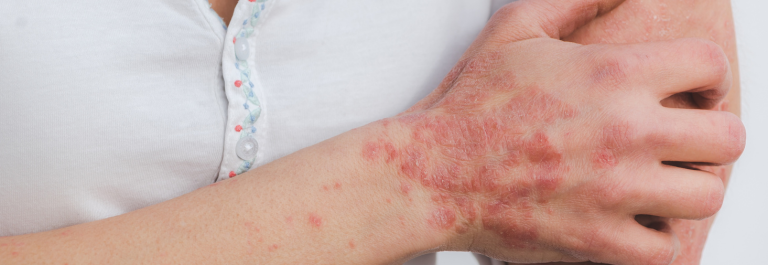Allergy symptoms are often associated with warmer months, but did you know that people with allergies can also experience their symptoms in the wintertime? It's a common misconception that allergies hibernate once the cold weather hits. In fact, people can experience allergies all year round. In the following article, you can learn more about:
-
What causes winter allergies
-
Winter allergy symptoms
-
Treatment for winter allergies
Read on to learn more about reducing allergy triggers and making the best of the winter allergy season.
Causes of Winter Allergies
Many are familiar with the itchy eyes and runny nose that hay fever and pollen allergies can cause in the spring and summer, but for some people, these symptoms persist into the cold weather. This might seem counterintuitive since these warm weather triggers don't stick around once the winter hits. For most, the cause of the allergy changes. Seasonal allergies in the wintertime are related to both indoor and outdoor allergens.
Indoor Allergens
Many people are vulnerable to allergens found commonly in homes, workplaces, and schools. While these exist all year round, they are especially bothersome in winter because we spend more time indoors. The most common allergens include:
-
Dust particles and dust mites: Dust is a common allergen, as are the mites that feed on it. A primary component of dust is dry skin flakes, which tend to accumulate more quickly in the wintertime due to drier air. Dust mites thrive on these skin cells, so a dust mite allergy sufferer will be significantly impacted at this time of year.
-
Mold spores: Mold and mildew tend to be more prevalent in winter, especially if you live in a wet climate. Indoor mold tends to build up more quickly when air circulation is low. Closing our windows and doors in the winter means the airflow is blocked.
-
Pet dander: While we love our furry friends, animal fur often collects proteins called dander, which trigger allergies. Like us, our pets spend more time indoors during the cold weather, concentrating dander inside our homes and triggering allergy symptoms.
Outdoor winter allergies
-
Mold spores: Mold isn't only an issue on the indoors. In colder climate winters, mold spores float in the air, aggravating allergy symptoms.
-
Winter pollen: In some parts of the southern United States, the mountain cedar tree (Ashe Juniper) can release high amounts of pollen from December to March, causing "cedar fever."
-
Hives: Some people develop allergic reactions to cold weather. In this case, hives and swelling might occur, which can usually be treated by oral antihistamines.
Winter Allergy Symptoms
No matter the time of year, allergic reactions have distinctive characteristics. These include:
-
Coughing
-
Sneezing
-
Runny nose (rhinorrhea)
-
Nasal congestion
-
Watery or itchy eyes
-
Sore throat
-
Wheezing or shortness of breath (allergic asthma)
-
Allergic shiners (dark circles under the eyes due to nasal congestion)
What's the Difference Between Colds and Winter Allergy Symptoms?
You may have noticed similar symptoms between winter allergies and another prevalent ailment during winter months: the common cold. In fact, there are clear distinctions between the two.
-
Duration of the symptoms: Colds don't typically last longer than a week or two, while chronic allergy symptoms can last much longer.
-
Types of symptoms: Fever and body aches are much more likely to be cold-related, while itchy, watery eyes are indicative of allergic reactions
How to Treat Winter Allergies
While there is no cure for winter allergies, there are many things you can do to reduce severe symptoms and prevent allergy triggers.
Winter Allergy Prevention
The best way to reduce winter allergies is to prevent them in the first place. Here are some things you can do to make you less likely to have an allergic reaction.
-
Wash bedding, towels, and clothing in hot water frequently to reduce microscopic bugs living in the fabric
-
Dust and vacuum often
-
Use hypoallergenic mattress and pillow covers to prevent dust mites from building up in bedding
-
Avoid hot showers. Hot water is more likely to dry our skin out, leading to more floating skin particles that feed dust mites
-
Prevent mold growth by using dehumidifiers or keeping windows open when possible
-
Bathe pets often to prevent the accumulation of pet dander
Winter Allergy Treatments
Some winter allergy sufferers find it helpful to add over the counter medications to their arsenal to reduce allergy symptoms. Effective products include:
-
Oral antihistamines
-
Nasal sprays
-
Decongestants
-
Eye drops
Natural Relief for Seasonal Allergies
Allergy symptoms can be irritating and sometimes even painful. Luckily, winter allergy sufferers have options to relieve discomfort.
Wear Protective Clothing
Common indoor allergens like pet dander, dust mites, and mold spores can often be found in the fabrics in our homes. While we can do our best to keep these clean and free of the things that might trigger symptoms, it's also helpful to take a proactive approach by choosing fabrics that protect your skin by keeping potential triggers out.
Wearing clothing made with anti-microbial material can reduce exposure to indoor air allergens by acting as a protective layer for the skin. The Remedywear™ Long Sleeve Shirt is available for adults and children and is made of anti-bacterial TENCEL and anti-inflammatory zinc-oxide. This powerful duo makes for a silky smooth fabric that keeps skin comfortable and cozy while protecting it from common winter allergens. Protect your entire body by matching the shirt with the Remedywear™ Pants (available in sizes for adults and kids).
Use Natural Skincare Products
The dry air in the wintertime and the discomfort that comes with allergen exposure mean that our skin needs a little extra TLC to keep it nourished. Natural skincare products with protective oils can help our skin stay hydrated without harsh chemicals that might further irritate our delicate skin barrier.
This Organic Manuka Skin Soothing Cream is a rich balm made from only six natural ingredients. It's perfect to use from head to toe and is designed with sensitive skin in mind, including skin conditions like psoriasis and eczema. Active Manuka oil has anti-bacterial and anti-fungal properties that work against many allergy triggers and keep itchy skin at bay.
Take your skin nourishment to the next level using a natural cleanser like the Coconut and Sunflower Oil Bar. This bar is gentle enough to use even in those with irritated skin from severe allergies and can be used on the entire body by the whole family. It's fragrance-free and made with only soothing ingredients like coconut oil, shea butter, and sunflower oil to leave your skin soothed and supple.
When to Seek Medical Care
While most winter allergies can be managed at home, there are times when you may need to seek treatment from a healthcare practitioner. Seek medical advice if prevention and over the counter medications aren't working for you. You may need a prescription treatment such as allergy shots.
Manage Winter Allergies Today
While winter allergy season can be both physically and mentally irritating, there are many things you can do to help. Use our tips to take control of your environment and provide soothing relief to your winter allergies today!










